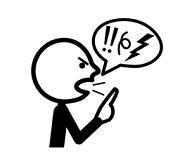The etymological origin of the word that we are now going to analyze in depth is found in Latin. Specifically, it comes from the verb “aggraviare”, which can be translated as “get worse” or “make heavier”.
A grievance is a harm , outrage or humiliation that is inflicted on a person through an act or certain words. Grievances can be linked to offenses. For example: “I will not tolerate another grievance on your part: I'm leaving here” , “The player decided to continue in the club until the grievances were changed to applause” , “The change in schedule is an affront to all of us who make this program.” ” .
 A subject may consider that a lie that is told about him is an insult. Take the case of a presidential candidate who, in a radio interview, maintains that the leader of another political party was illicitly enriched. The leader affected by the comment comes out to respond in the same medium and states that, if the candidate does not recant his grievance, he will sue him.
A subject may consider that a lie that is told about him is an insult. Take the case of a presidential candidate who, in a radio interview, maintains that the leader of another political party was illicitly enriched. The leader affected by the comment comes out to respond in the same medium and states that, if the candidate does not recant his grievance, he will sue him.
Grievances can also be situations that someone considers offensive or demeaning . Suppose that a journalist who is dedicated to carrying out political and economic analysis in a newspaper publishes an article that upsets a powerful man. Faced with this situation, the editor-in-chief changes the journalist's duties and sends him to the entertainment sector to write short articles about gossip and rumors in that environment. Taking into account the impact that his previous articles had and the low relevance of the new position, the journalist feels the victim of a grievance on the part of his superior at the newspaper and makes the decision to resign, considering that the medium does not respect or value his work .
Within the more colloquial sphere, it is common to resort to the use of what has been called comparative grievance. When this expression is used it is to refer to the fact that a person has received unequal treatment compared to another who is in the same position and who, therefore, should have the same rights.
A clear example of comparative grievance can be found within the workplace. Thus, if there is a man and a woman who occupy the same position in a company and perform the same functions, it is considered that it would be a comparative offense if the female received a lower salary simply for belonging to the female gender.
In the field of law we cannot ignore that it is very common to resort to the use of comparative grievance as a way to get a sanction that has been imposed against a person to be withdrawn. That would lead, for example, to someone who has been fined for parking his vehicle incorrectly, in his appeal to have it withdrawn, alleging that all the cars in that area were also parked incorrectly but that only him it was filed by her.
